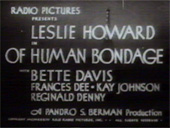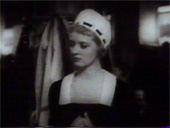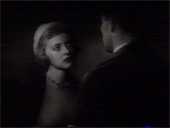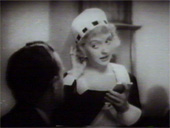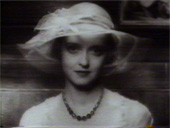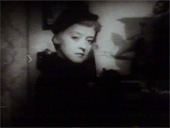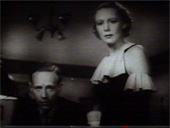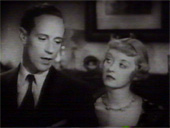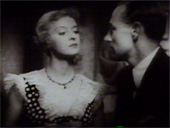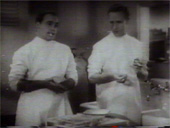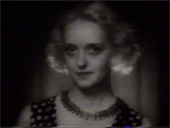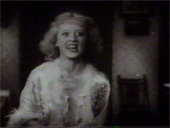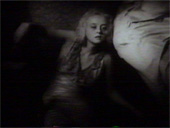Bette's rise to the top started with humble beginnings. She came to
Hollywood during the introduction of talking films, after a modest success
on the stage. After signing with Warner Brothers, she took bit
parts, gradually building a fan base, and establishing herself as a hard
working actress.
By the time the script for Of
Human Bondage was making its rounds, Davis was primed to take a starring
role. The role of Mildred Rogers was a difficult one to cast, not
only because it required someone who could act, but the role was anything
but glamorous, and many actresses were afraid to play a vulgar waitress
who suffers an indignant death. On the other hand, this was
just the kind of role that Davis was craving.
Jack Warner wasn't willing to loan
Davis out for the picture, feeling that such a role could have a damaging
impact on her burgeoning career. Davis continued to fight to play
Mildred until she ultimately got her way.
Life magazine declared her
performance "probably the best performance ever recorded on screen by
a U.S. actress." Audiences were applauding and cheering in the
theatres everywhere. An Oscar nomination for the 1934 awards seemed
like a sure thing.
When Davis failed to get a
nomination, there was a great uproar, and already dissatisfied members of
the Screen Actors Guild used the opportunity to site unfair practices by
the Academy. The Academy was forced to give way to pressure that
year and allow for write-in votes, thus still giving Davis a shot at the
big prize.
According to Davis, it seemed like
a sure thing that she would win, but, as she put it later, a campaign was
waged by her own studio boss, Jack Warner, to shut her out of the race by
instructing employees to vote for her opponents. She also felt that
they were purposely not promoting her, which she stated was idiotic, as
'it was to their profit, if I won.'
In the end, Claudette Colbert
joined her film maker and her co-star in the first ever sweep of the top
prizes, by winning the Best Actress Award for It Happened One
Night, a
role that Bette Davis had turned down.
As a result of the Oscar snub, the
Academy changed the rules the next year, allowing all members of each
branch to vote on nominations, and five nominees were allowed for each
award.
Meanwhile, Davis sighed at the
experience, stating that it was 'just as well' that she didn't win.
The film was still a huge success, due in large part to the controversy
over her apparent snub for Best Actress, and as Davis put it, a win for
her first great role would have 'looked like fast work - too fast.
Not good for me."
